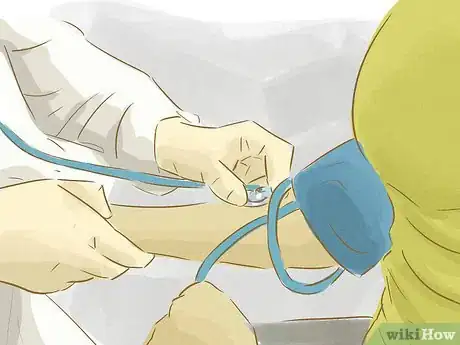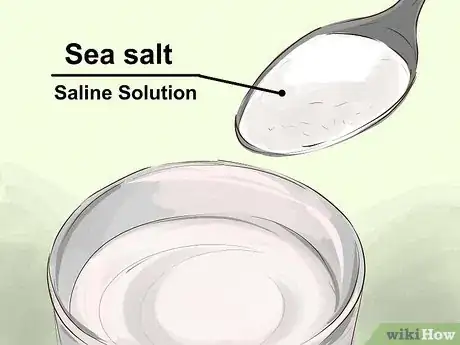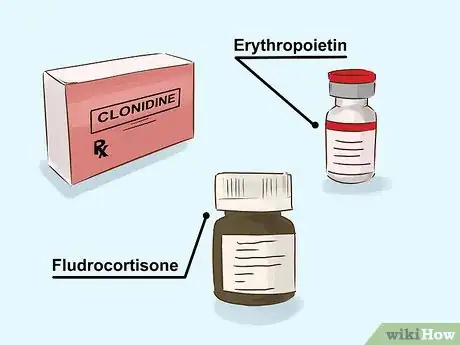This article was medically reviewed by Jennifer Boidy, RN. Jennifer Boidy is a Registered Nurse in Maryland. She received her Associate of Science in Nursing from Carroll Community College in 2012.
There are 15 references cited in this article, which can be found at the bottom of the page.
This article has been viewed 58,879 times.
Whether you have certain medical conditions like chronic fatigue syndrome,[1] fibromyalgia,[2] or are just dehydrated, you may need to increase your blood volume.[3] Blood volume is important, as proper volume is essential to maintaining and regulating your cardiovascular system and supplying oxygen and nutrients to other major organs.[4] However, for people with certain medical conditions, it may be difficult to increase blood volume in a sustainable way. By consulting your doctor, by looking at natural options, and considering medications or supplements, you may be able to increase your blood volume.
Steps
Consulting Your Doctor
-
1Consult with a doctor if you suspect you have low blood volume. Low blood volume (hypovolemia) can be the result of a serious medical condition that requires treatment, so it is important to consult your doctor before you try to do anything else. Symptoms that may indicate that you are hypovolemic include dry mucous membranes, lost elasticity in the skin, decreased urine output, and an increased heart rate.[5]
- If low blood volume is not addressed in its early stages, then it can lead to hypovolemic shock, which is a medical emergency.
-
2Work with your doctor. It is important to work with your doctor to diagnose and treat underlying medical conditions. Before taking steps to increase your blood volume, you should consult your doctor about any conditions you may have that necessitate it. Without speaking with your doctor, you may not understand the intricacies of your condition or know about the potential dangers inherent in treatment. Your doctor will consider:
- If you have a metabolic disorder or disease like diabetes. If you do, you may be unable to rely on certain treatments, such as supplements or solutions that include glucose.[6]
- If you have low blood volume, your doctor will take steps to diagnose conditions like chronic fatigue syndrome, fibromyalgia, anemia, heart failure, or internal bleeding.[7]
Advertisement -
3Follow your doctor’s instructions. When trying to increase your blood volume, you need to follow your doctor’s instructions carefully. By acting on your own, without the guidance of a professional, you may put your health in jeopardy.
- Do not try to increase your blood volume on your own if you have any sort of metabolic or blood disorder.
- If medically necessary, your doctor may prescribe prescription medications to help you increase your blood volume.
- Inform your doctor before taking any action to increase your blood volume.
-
4Monitor your blood volume regularly. When trying to increase your blood volume, you need to monitor your blood pressure and other vital statistics. Although these statistics won't exactly reflect your blood volume, they may give you an indication of whether your efforts are working. Watch your:
- Heart rate
- Pulse
- Blood pressure
- Blood sugar, if you are diabetic[8]
-
5Ask your doctor about starting an endurance exercise program. Recent studies have linked endurance training with an increase in blood volume over time. Thus, committing to an endurance exercise routine is one of the simplest ways to naturally increase your blood volume. The blood volume increase produced by exercise improves exercise performance and cardiovascular fitness. However, make sure to check with your doctor first.[9]
- Consider engaging in a cardio workout regularly. For instance, run, walk, swim, or cycle 3 to 5 times a week for 30 minutes to 1 hour – or even longer.
- Your cardio program should last months rather than weeks, and it also needs to be maintained to maintain the increased blood volume. Studies have shown that red blood cell volume increases after about 2 to 4 weeks. Thus, you’ll likely see best results after 1 to 2 months of cardio.[10]
Increasing Blood Volume with Medical Treatments
-
1Have a blood transfusion. Your doctor may order a blood transfusion to replace blood that has been lost through surgery, major injury, or a medical condition. This will increase your blood volume by putting more blood directly into your body.[11]
-
2Get IV fluid therapy. IV fluid therapy may be administered by a qualified medical professional if your doctor thinks it is necessary. IV fluid therapy is also known as a volume expander, which includes saline solution and is used to treat fluid loss associated with blood loss.[12]
- Saline solution will be given to you under the direction of a medical professional if you are dehydrated or have other medical conditions.
- Talk to your doctor about saline solution if you think it might work for you in increasing your blood volume.[13]
-
3Discuss iron supplements with your doctor. Iron supplementation boosts red cell production, which helps your body to carry oxygen throughout your body. However, do not start taking an iron supplement unless you have been directed to do so by your doctor.[14]
-
4Ask your doctor about growth factors to increase your blood volume. Growth factors cause the bone marrow to make more blood cells. One example of this type of drug is Erythropoietin (EPO).[15]
References
- ↑ https://www.ncbi.nlm.nih.gov/pmc/articles/PMC6262290/
- ↑ https://pubmed.ncbi.nlm.nih.gov/24549923/
- ↑ https://www.britannica.com/science/dehydration-physiology
- ↑ https://my.clevelandclinic.org/health/body/21640-blood-vessels
- ↑ https://www.healthgrades.com/conditions/hypovolemia
- ↑ https://my.clevelandclinic.org/health/diseases/10783-metabolic-syndrome
- ↑ https://medlineplus.gov/ency/article/000039.htm
- ↑ https://www.endocrineweb.com/conditions/diabetes/can-blood-sugar-affect-blood-pressure
- ↑ https://pubmed.ncbi.nlm.nih.gov/17630597/
- ↑ https://www.ncbi.nlm.nih.gov/pubmed/1798375
- ↑ https://www.nhlbi.nih.gov/health/health-topics/topics/bt/
- ↑ https://www.msdmanuals.com/professional/critical-care-medicine/shock-and-fluid-resuscitation/intravenous-fluid-resuscitation
- ↑ https://www.ncbi.nlm.nih.gov/pmc/articles/PMC1494120/
- ↑ https://www.eatright.org/food/vitamins-and-supplements/types-of-vitamins-and-nutrients/give-your-teens-iron-a-boost
- ↑ https://pubmed.ncbi.nlm.nih.gov/17095558/














-Step-14-Version-2.webp)






















































Medical Disclaimer
The content of this article is not intended to be a substitute for professional medical advice, examination, diagnosis, or treatment. You should always contact your doctor or other qualified healthcare professional before starting, changing, or stopping any kind of health treatment.
Read More...